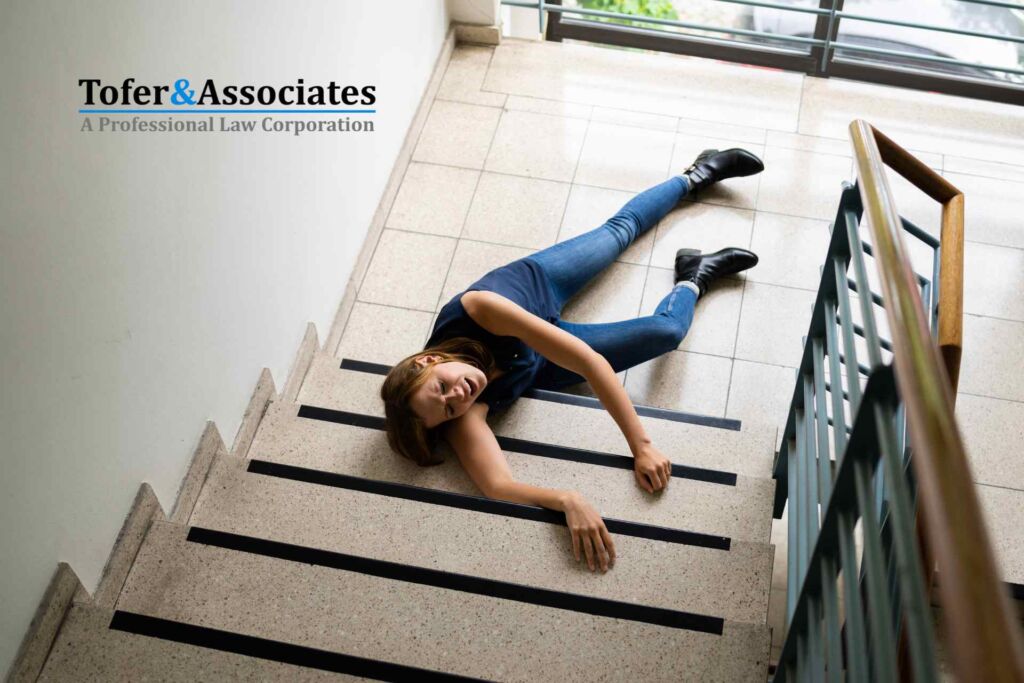Slip-and-fall accidents can happen in an instant, transforming a normal day into a painful ordeal. Whether you tripped on an uneven surface or slipped on a wet floor, it’s essential to understand your rights and the legal implications if such an incident occurs. This guide aims to shed light on the intricacies of California Slip and Fall laws, including the limitations, potential compensation, and the crucial steps you should take following an accident.
Understanding California’s Slip and Fall Laws

In California, slip and fall cases fall under premises liability laws, a subset of personal injury laws. These laws hold property owners responsible for maintaining safe conditions. If they fail to do so, they can be held liable for any resulting injuries. For instance, if a grocery store fails to clean up a spill and a customer slips, the store could be considered negligent under California Civil Code Section 1714(a).
Premises liability laws require property owners to exercise reasonable care in maintaining their premises. This includes regular inspections, timely repairs, and clear warnings of any potential hazards. Failure to meet these standards can result in liability for accidents and injuries that occur on their property.
The Role of California’s Personal Injury Laws in Slip and Fall Cases
Personal injury laws in California are designed to protect individuals who suffer harm due to the negligence or recklessness of others. In slip and fall cases, these laws ensure that victims can seek compensation for their injuries. The key question in these cases is whether the property owner exercised reasonable care in maintaining the safety of their premises.
For example, if you slip on an unmarked wet floor in a supermarket, the store may be liable for your injuries if they failed to clean up the spill or provide adequate warning. Similarly, if you trip over a broken step in an apartment complex, the landlord could be held responsible if they knew about the hazard and did not take steps to repair it.
Slip and Fall Lawsuit: Understanding the Statute of Limitations In California
Time is of the essence when it comes to filing a slip and fall lawsuit in California. The slip and fall statute of limitations sets the deadlines for taking legal action:
- Private Property: You have two years from the date of the accident to file a personal injury lawsuit.
- Government Property: If the injury occurred on government property, such as a public sidewalk, the time limit is six months.
If the injury is not immediately apparent, California’s “discovery rule” allows the statute of limitations to start when the injury is discovered or should have been discovered. This is particularly relevant for injuries that may not manifest immediately, such as internal injuries or traumatic brain injuries.
Seeking Compensation for Slip and Fall Injuries
Navigating the compensation process can be challenging. Here’s a breakdown of what to expect:
- Insurance Claims: The first step is usually filing a claim with the property owner’s insurance company. Be prepared, as insurance companies often try to minimize payouts. It is essential to gather and present all relevant evidence, including medical bills, witness statements, and any photographic or video evidence of the accident scene.
- Settlements: Many slip and fall cases are settled out of court. The process typically involves negotiations between your lawyer and the insurance company. If a settlement is reached, it can prevent the need for a lengthy trial.
The compensation you may receive can cover various damages, including:
- Medical Expenses: This includes hospital bills, medication, physical therapy, and any future medical costs related to the injury.
- Lost Wages: If the injury caused you to miss work, you might be compensated for lost income. In cases of long-term or permanent disability, you may also receive compensation for loss of earning capacity.
- Pain and Suffering: Compensation for physical pain and emotional distress caused by the injury.
The Impact of Comparative Negligence
California follows the principle of “pure comparative negligence,” which means that if you are partially at fault for your slip and fall, your compensation will be reduced by your percentage of fault. For example, if you are found to be 30% at fault and your damages are $100,000, you would receive $70,000.
This principle ensures that even if you bear some responsibility for the accident, you can still recover a portion of your damages. However, it also means that you must be prepared to defend against claims of shared fault, which can complicate the legal process.
Special Rules for Government Property
If your slip and fall accident occurs on government property, the California Tort Claims Act imposes special rules:
- Notice Requirement: You must notify the relevant government agency within six months of the incident. This notice should include details about the accident, the nature of your injuries, and your intention to seek compensation.
- Immunity and Reasonable Time to Repair: Government entities have certain immunities and must be given a reasonable amount of time to repair known hazards before they can be held liable.
Navigating claims against government entities can be particularly challenging due to these additional requirements and potential immunities. It’s crucial to understand these nuances and seek legal advice to ensure your claim is filed correctly and timely.
Steps to Take Following a Slip and Fall Accident
Taking the right steps immediately following a slip and fall accident can significantly impact your ability to file a successful claim:
- Seek Medical Attention: Your health is the priority. Ensure that any injuries are documented, as medical records will be crucial evidence in your case.
- Report the Incident: Inform the property owner or manager about the accident. Request that they create an incident report.
- Gather Evidence: Collect as much evidence as possible. This includes taking photos of the accident scene, obtaining contact information for witnesses, and preserving any physical evidence (like the shoes you were wearing).
- Keep Detailed Records: Maintain a file with all documents related to the accident, including medical bills, correspondence with insurance companies, and any legal documents.
- Consult a Lawyer: Seek advice from a personal injury lawyer experienced in slip and fall cases to evaluate your situation and guide you through the legal process.
Frequently Asked Questions
- How long after an accident can you sue for personal injury in California?
-
- Generally, you have two years from the date of the accident to file a lawsuit.
- What is the statute of limitations for personal injuries in California?
-
- For most personal injury cases, including slip and falls, the statute of limitations is two years.
- What is the law for slip and fall in California?
-
- Property owners must maintain safe conditions. If they fail to do so and someone gets injured, they can be held liable under premises liability laws.
- What is the average payout for a slip and fall in California?
-
- Payouts vary based on the severity of injuries, medical costs, and lost wages, but typically range from $15,000 to $45,000.
Conclusion
Slip and fall accidents in California involve understanding premises liability laws, the statute of limitations, and the comparative negligence principle. If you’ve been injured, it’s crucial to act quickly and seek professional legal assistance to navigate the complexities of filing a claim and securing compensation. By understanding these elements, you can better protect your rights and seek the compensation you deserve.
This guide provides a detailed overview of the legal framework surrounding slip and fall cases in California, helping you understand your rights and the steps to take if you find yourself injured due to someone else’s negligence.
Disclaimer: This blog post is for informational purposes only and should not be construed as legal advice. Please consult with a qualified attorney to discuss your specific case.

